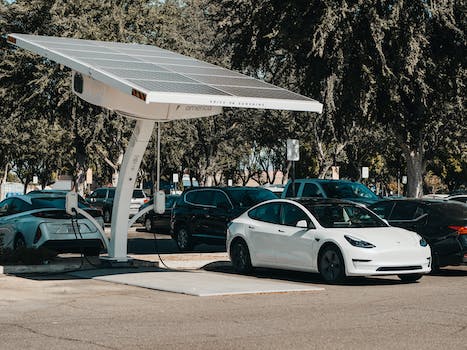
The Latest Innovations in Car Connectivity Technology
-
Table of Contents
- Introduction
- Exploring the Benefits of the Latest Connected Car Technology
- How Automakers are Leveraging Connected Car Technology to Enhance the Driving Experience
- Understanding the Security Implications of Connected Car Technology
- Exploring the Potential of Autonomous Vehicle Technology and Connected Car Technology
- Examining the Impact of Connected Car Technology on the Automotive Industry
- Conclusion
Introduction
The automotive industry is constantly evolving and introducing new technologies to make driving safer and more enjoyable. One of the most exciting developments in recent years has been the introduction of car connectivity technology. This technology allows drivers to stay connected to their vehicles and the world around them in ways that were previously impossible. From hands-free calling and texting to real-time traffic updates and navigation, car connectivity technology is revolutionizing the way we drive. In this article, we will explore some of the latest innovations in car connectivity technology and how they are changing the way we drive.
Exploring the Benefits of the Latest Connected Car Technology
The connected car technology revolution is here, and it’s changing the way we drive. From improved safety features to enhanced convenience, the latest connected car technology is making driving easier and more enjoyable than ever before. Here, we’ll explore some of the key benefits of this cutting-edge technology.
Safety
Connected car technology is designed to make driving safer. Many of the latest vehicles are equipped with advanced driver assistance systems (ADAS) that can detect potential hazards and alert the driver. These systems can also help drivers stay in their lane and maintain a safe distance from other vehicles. Additionally, some connected car systems can even detect when a driver is distracted or drowsy and alert them to take a break.
Convenience
Connected car technology also makes driving more convenient. Many vehicles now come with features like remote start, which allows drivers to start their car from a distance. This can be especially useful in cold weather, as it allows drivers to warm up their car before getting in. Additionally, some connected car systems can even provide real-time traffic updates, helping drivers avoid congested areas and get to their destination faster.
Entertainment
Connected car technology can also provide entertainment. Many vehicles now come with built-in infotainment systems that allow drivers to access their favorite music, podcasts, and more. Additionally, some systems can even connect to a driver’s smartphone, allowing them to make hands-free calls and send text messages while on the go.
The connected car revolution is here, and it’s changing the way we drive. From improved safety features to enhanced convenience, the latest connected car technology is making driving easier and more enjoyable than ever before. Whether you’re looking for improved safety, convenience, or entertainment, the latest connected car technology has something to offer.
How Automakers are Leveraging Connected Car Technology to Enhance the Driving Experience
The automotive industry is rapidly evolving, and connected car technology is playing a major role in this transformation. Automakers are leveraging this technology to enhance the driving experience and create a more connected, personalized, and safe experience for drivers.
Connected car technology allows vehicles to communicate with each other and with the outside world. This technology enables automakers to provide drivers with a range of features and services, such as real-time traffic updates, navigation assistance, and remote diagnostics. It also allows automakers to collect data on driving habits and vehicle performance, which can be used to improve the driving experience.
One of the most popular connected car features is infotainment systems. These systems provide drivers with access to music, navigation, and other entertainment options. Automakers are also using connected car technology to provide drivers with access to real-time traffic updates, which can help them avoid congested areas and plan their routes more efficiently.
Safety is another area where connected car technology is making a difference. Automakers are using this technology to provide drivers with access to advanced driver assistance systems (ADAS). These systems use sensors and cameras to detect potential hazards and alert drivers to take action. Automakers are also using connected car technology to provide drivers with access to emergency services, such as roadside assistance and emergency response.
Connected car technology is also being used to create a more personalized driving experience. Automakers are using this technology to provide drivers with access to personalized settings, such as seat and climate control preferences. They are also using this technology to provide drivers with access to personalized services, such as vehicle maintenance reminders and fuel efficiency tips.
Connected car technology is revolutionizing the automotive industry and transforming the driving experience. Automakers are leveraging this technology to provide drivers with a more connected, personalized, and safe experience. As this technology continues to evolve, we can expect to see even more features and services that will further enhance the driving experience.
Understanding the Security Implications of Connected Car Technology

The rise of connected car technology has revolutionized the automotive industry, providing drivers with a range of new features and capabilities. However, with this new technology comes a range of security implications that must be addressed.
Connected cars are equipped with a range of sensors and systems that allow them to communicate with other vehicles, as well as with external networks. This means that they are vulnerable to a range of cyber threats, including malicious software, data theft, and even physical attacks.
One of the most serious security threats posed by connected cars is the potential for hackers to gain access to the vehicle’s systems. This could allow them to control the car’s brakes, steering, and other functions, potentially putting the driver and other road users at risk.
Another security concern is the potential for data theft. Connected cars generate a large amount of data, including location, speed, and other information. This data could be used to track the vehicle’s movements, or even to gain access to personal information stored in the car’s systems.
Finally, connected cars are also vulnerable to physical attacks. Hackers could gain access to the car’s systems by physically tampering with the vehicle, or by using wireless technologies such as Bluetooth or Wi-Fi.
To protect against these threats, car manufacturers must ensure that their vehicles are equipped with robust security measures. This includes encrypting data, using secure authentication protocols, and regularly updating the car’s software.
In addition, drivers should be aware of the security implications of connected car technology and take steps to protect their vehicles. This includes avoiding leaving the car unattended in public places, using strong passwords, and regularly checking for software updates.
By taking these steps, drivers can help ensure that their connected cars remain secure and that they can enjoy the benefits of this new technology without compromising their safety.
Exploring the Potential of Autonomous Vehicle Technology and Connected Car Technology
The automotive industry is undergoing a major transformation, with the emergence of autonomous vehicle technology and connected car technology. These two technologies are revolutionizing the way we drive, and have the potential to revolutionize the entire automotive industry.
Autonomous vehicle technology is the use of artificial intelligence and sensors to enable a vehicle to drive itself without the need for a human driver. This technology has the potential to drastically reduce the number of accidents on the road, as well as reduce traffic congestion. Autonomous vehicles are also more efficient than human drivers, as they can react faster and more accurately to changing conditions on the road.
Connected car technology is the use of wireless technology to connect a vehicle to the internet. This technology allows vehicles to communicate with each other, as well as with other devices such as traffic lights and road signs. This technology has the potential to improve safety on the road, as well as reduce traffic congestion. It can also be used to provide drivers with real-time information about traffic conditions, road closures, and other important information.
The potential of autonomous vehicle technology and connected car technology is immense. These technologies have the potential to revolutionize the automotive industry, and make driving safer, more efficient, and more enjoyable. As these technologies continue to develop, it is important to explore their potential and ensure that they are used responsibly and ethically.
Examining the Impact of Connected Car Technology on the Automotive Industry
The automotive industry is undergoing a major transformation, and connected car technology is at the forefront of this revolution. Connected car technology is a term used to describe the integration of the internet and other digital technologies into vehicles. This technology has the potential to revolutionize the way we drive, making cars smarter, safer, and more efficient.
Connected car technology is already having a major impact on the automotive industry. For starters, it is making cars more efficient. By connecting cars to the internet, drivers can access real-time traffic information, allowing them to plan their routes more efficiently and avoid traffic jams. This can save drivers time and money, as well as reduce their carbon footprint.
Connected car technology is also making cars safer. By connecting cars to the internet, drivers can access real-time information about road conditions, such as potholes, construction, and accidents. This can help drivers avoid dangerous situations and reduce the risk of accidents. Additionally, connected car technology can be used to alert drivers to potential hazards, such as animals or pedestrians in the road.
Finally, connected car technology is making cars more convenient. By connecting cars to the internet, drivers can access a variety of services, such as navigation, music streaming, and even remote vehicle diagnostics. This can make driving more enjoyable and make it easier to stay connected while on the go.
Overall, connected car technology is having a major impact on the automotive industry. It is making cars more efficient, safer, and more convenient, and it is only going to become more important in the years to come. As the technology continues to evolve, it will continue to revolutionize the way we drive.
Conclusion
The latest innovations in car connectivity technology have revolutionized the way we interact with our vehicles. From voice-activated commands to remote access, these technologies have made driving safer, more convenient, and more enjoyable. With the continued development of these technologies, the possibilities for car connectivity are endless. As the automotive industry continues to evolve, car connectivity technology will continue to be a major factor in the future of driving.






